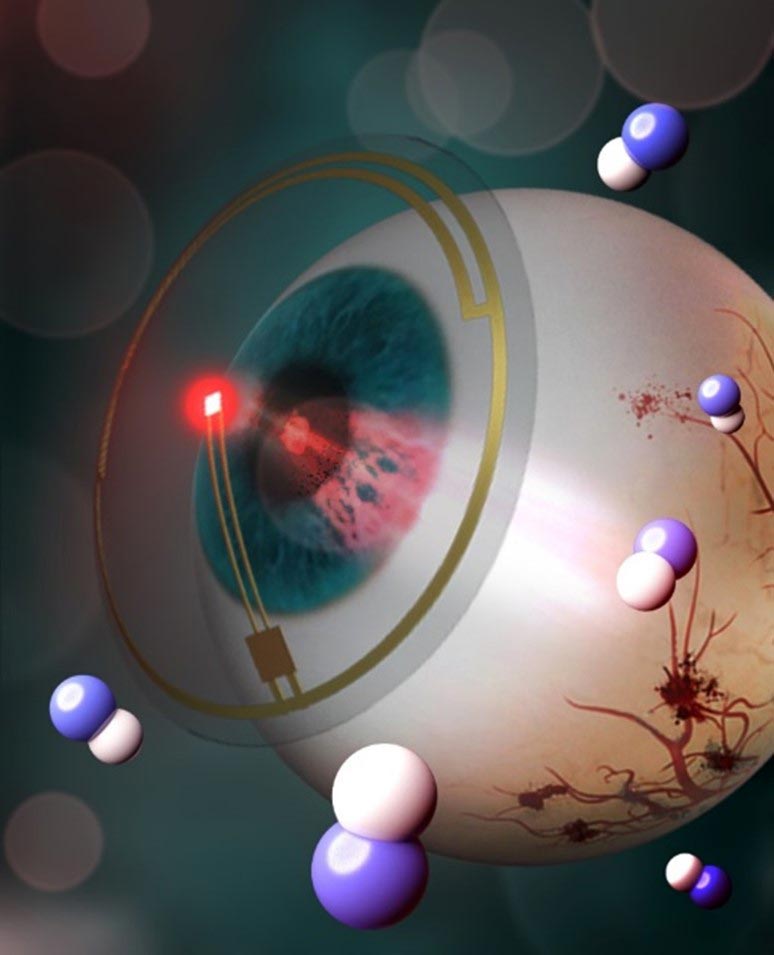
Schematic diagram of the prevention and early treatment system for diabetic retinopathy using wirelessly driven smart contact lenses equipped with LEDs. Credit: POSTECH
Smart LED contact lenses developed for treating diabetic retinopathy.
Diabetes is a long-term chronic disease with many complications and requires lifelong care. The longer a patient suffers from diabetes, the higher the risk of developing retinopathy (disease of the retina) which can progressively lead to a decline in vision and even to blindness.
A POSTECH research team led by Professor Sei Kwang Hahn and Ph.D. candidate Geon-Hui Lee (Department of Materials Science and Engineering) in collaboration with Dr. Sangbaie Shin of PHI BIOMED Co. has recently developed a smart contact lens-type wearable device to prevent diabetic retinopathy and treat it in its early stages by irradiating 120 µW far red/LED light to the retina. This technology for smart LED contact lenses has attracted a great deal of attention for various ophthalmologic diseases.
Diabetic retinopathy is currently treated by highly invasive repeated therapeutic injections to the eyeball or thousands of small burns made with a laser to destroy capillaries near the edges of the retina under anesthesia. Both procedures are considered highly painful for the patient.
Through the study with diabetic animal models, the researchers confirmed that the diabetic retinopathy did not appear in animals that wore the smart contact lenses for 15 minutes 3 times a week for a total of 8 weeks. In contrast, the animals that did not wear the lenses showed retinopathic conditions. The safety and effectiveness of the lenses were also confirmed by the histological analysis of the cornea and retina.
“This study has demonstrated the feasibility of a lens-type wearable device for the applications not only to monitoring oxygen saturation, heart beating rate, and ophthalmologic diseases, but also to treating depression, insomnia, neuronal diseases, and more,” remarked Professor Sei Kwang Han who led the study.
Reference: “Smart Wireless Near-Infrared Light Emitting Contact Lens for the Treatment of Diabetic Retinopathy” by Geon-Hui Lee, Cheonhoo Jeon, Jee Won Mok, Sangbaie Shin, Su-Kyoung Kim, Hye Hyeon Han, Seong-Jong Kim, Sang Hoon Hong, Hwanhee Kim, Choun-Ki Joo, Jae-Yoon Sim and Sei Kwang Hahn, 29 January 2022, Advanced Science.DOI: 10.1002/advs.202103254
Published in the international academic journal Advanced Science, this study was conducted with support from the Nano · Material Technology Development Program, Disease Oriented Translational Research, Mid-career Researcher Program, Brain Korea 21 Fostering Outstanding Universities (FOUR) project, and the Korea Medical Device Development Fund of the National Research Foundation of Korea, and by the World Class 300 Project of the Ministry of SMEs and Startups of Korea.
Source: SciTechDaily
Do you mind if I quote a couple of your articles as long asI provide credit and sources back to your website?My blog site is in the very same niche as yours and my users would certainly benefit from some of the information you present here.Please let me know if this okay with you. Thanks!
852297 802010I simply could not go away your website prior to suggesting that I actually enjoyed the regular info an individual supply to your visitors? Is gonna be once again continuously in order to look at new posts 73284
741731 741026Some truly amazing articles on this web site , appreciate it for contribution. 951908